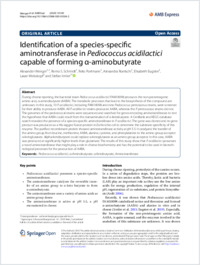Identification of a species-specific aminotransferase in Pediococcus acidilactici capable of forming α-aminobutyrate
- Wenger, Alexander Agroscope, Schwarzenburgstrasse 161, 3003 Bern, Switzerland - Department of Biology, University of Fribourg, Rue Albert‑Gockel 3, 1700 Fribourg, Switzerland
- Schmidt, Remo S. Agroscope, Schwarzenburgstrasse 161, 3003 Bern, Switzerland
- Portmann, Reto Agroscope, Schwarzenburgstrasse 161, 3003 Bern, Switzerland
- Roetschi, Alexandra Agroscope, Schwarzenburgstrasse 161, 3003 Bern, Switzerland
- Eugster, Elisabeth Bern University of Applied Sciences, School of Agricultural, Forest, and Food Sciences HAFL, Länggasse 85, 3052 Zollikofen, Switzerland
- Weisskopf, Laure Department of Biology, University of Fribourg, Rue Albert‑Gockel 3, 1700 Fribourg, Switzerland
- Irmler, Stefan Agroscope, Schwarzenburgstrasse 161, 3003 Bern, Switzerland
-
29.05.2020
Published in:
- AMB Express. - 2020, vol. 10, no. 1, p. 100
English
During cheese ripening, the bacterial strain Pediococcus acidilactici FAM18098 produces the non-proteinogenic amino acid, α-aminobutyrate (AABA). The metabolic processes that lead to the biosynthesis of this compound are unknown. In this study, 10 P. acidilactici, including FAM18098 and nine Pediococcus pentosaceus strains, were screened for their ability to produce AABA. All P. acidilactici strains produced AABA, whereas the P. pentosaceus strains did not. The genomes of the pediococcal strains were sequenced and searched for genes encoding aminotransferases to test the hypothesis that AABA could result from the transamination of α-ketobutyrate. A GenBank and KEGG database search revealed the presence of a species-specific aminotransferase in P. acidilactici. The gene was cloned and its gene product was produced as a His-tagged fusion protein in Escherichia coli to determine the substrate specificity of this enzyme. The purified recombinant protein showed aminotransferase activity at pH 5.5. It catalyzed the transfer of the amino group from leucine, methionine, AABA, alanine, cysteine, and phenylalanine to the amino group acceptor α-ketoglutarate. Αlpha-ketobutyrate could replace α-ketoglutarate as an amino group acceptor. In this case, AABA was produced at significantly higher levels than glutamate. The results of this study show that P. acidilactici possesses a novel aminotransferase that might play a role in cheese biochemistry and has the potential to be used in biotechnological processes for the production of AABA.
- Faculty
- Faculté des sciences et de médecine
- Department
- Département de Biologie
- Language
-
- English
- Classification
- Biological sciences
- License
-
License undefined
- Identifiers
-
- RERO DOC 328906
- DOI 10.1186/s13568-020-01034-2
- Persistent URL
- https://folia.unifr.ch/unifr/documents/309064
Other files
Statistics
Document views: 142
File downloads:
- pdf: 132
- Supplementary material: 79

